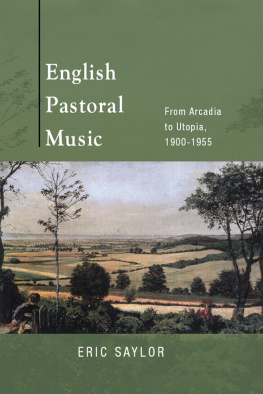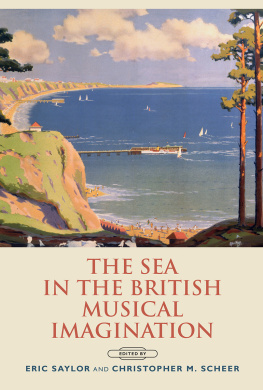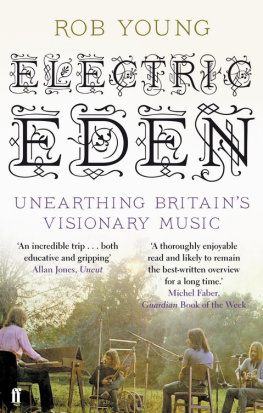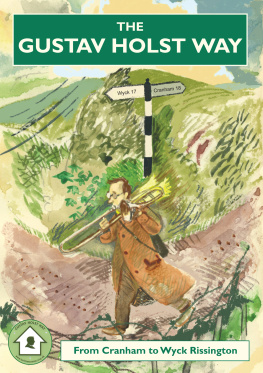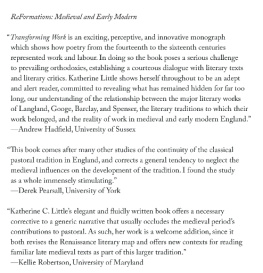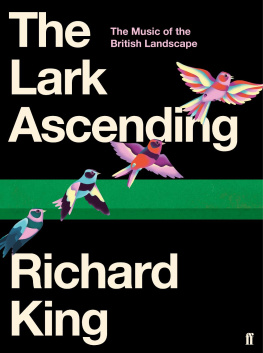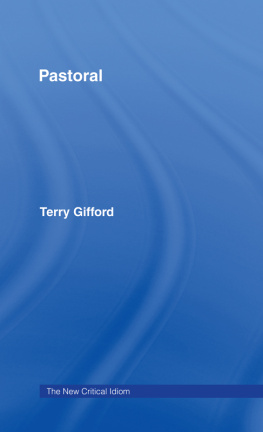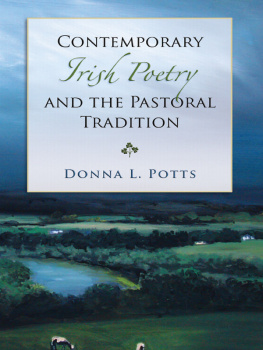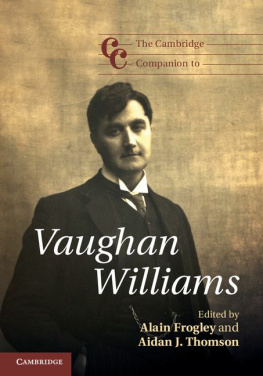Acknowledgments
I wrote most of this book at my home and office in central Iowa, which is also the region where I grew up. When I was a child, my bedroom window overlooked a vast pasture bordered by trees, the Iowa River sluggishly curving around the far corner on its journey east. The midsummer whirr of cicadas and the distant rumble of trains, the springtime flooding of the river valley, the sight of a person fishing or riding a horse along the edge of the treelinethese gave me an intuitive understanding of the understated power and beauty of the pastoral from an early age (even if I didn't always appreciate it). Many years later, when I first saw the English countrysidethe backdrop for so many pieces of music that I had come to knowI was struck by the same sensation that Ralph Vaughan Williams described upon first hearing the music of Richard Wagner: the feeling of recognition as of meeting an old friend which comes to us all in the face of great artistic experiences. Even though I was separated by an ocean and most of a century from the artists who established the English pastoral style, their works still resonated with my own experience growing up amidst similar surroundings.
Since that first visit to England, I have spent a great deal of time writing and thinking about the nature of that country's pastoral music. Portions of chapters are based on research that I originally published in It's Not Lambkins Frisking At All: English Pastoral Music and the Great War, Musical Quarterly 91, no. 12 (Spring/Summer 2008): 3959, while other passages throughout the book develop ideas that initially germinated while I was writing my master's thesis and doctoral dissertation. In short, this volume has been a long time coming, and I have many people to thank for helping nurture it along.
First, I am fortunate to work at an institution that values and actively facilitates its faculty's scholarship. Funding and support provided by Drake University's College of Arts and Sciences, the Office of the Provost, the Department of Music, and Drake University's Center for the Humanities were essential to completing my research and writing. My thanks also to Stephen Smith, whose generous patronage allowed me to undertake a crucial second research trip during my sabbatical year; his open enthusiasm for my work validated many beliefs and banished many doubts.
As every book is a collaborative project, I am lucky to have colleagues, students, and friends who have provided constructive criticism, encouragement, suggestions, and material support, and were always happy to share their knowledge and talents. My gratitude, therefore, to Byron Adams, Michael Barlow, Christina Bashford, Jonathan Bellman, Robert Brinkmann, Michael Burden, Jeffrey Carter, Hugh and Kate Cobbe, Adle Commins, Rachel Cowgill, Jennifer Doctor, William Dougherty, Stephen Downes, Anna Gebhardt, Deborah Heckert, Stephanie Heriger, Sarah Hogan, Kate Kennedy, Matt Kickasola, Stanley Kleppinger, Kendra Preston Leonard, Stephen Lloyd, Charles McGuire, Michelle Meinhart, Louis Niebur, Julian Onderdonk, Danielle Peters, Nathan Platte, Jason Rosenholtz-Witt, Philip Rupprecht, Julian Rushton, Scott Southard, Tiffany Stern, Aidan Thomson, Ann van Allen-Russell, Justin Vickers, and Amanda Eubanks Winklerall of you helped shape this work. I am especially indebted to Daniel Grimley, Jenna Harmon, Jennifer Oates, and Christopher Scheer for reading extended drafts of multiple chapters and providing immensely helpful feedback in return. Special thanks also to Annabel Brown, who has provided both abiding friendship and the hospitality of Camden's finest flat over the many years and trips to England that it took to complete this book.
I owe many thanks to the librarians and archivists who provided me with their time and assistance, including Nicolas Bell, Richard Chesser, Steve Cork, the late Oliver Neighbour, Rupert Ridgewell, Sandra Tuppen, and all those who staff the Rare Books and Music circulation and reader assistance desks at the British Library; Sarah Batchelor, Maira Canzonieri, and Peter Horton at the Royal College of Music; Colin Harris and Martin Holmes at the Bodleian Libraries, the University of Oxford, as well as the staff in Special Collections; Margaret Jones at the Cambridge University Library and Patricia McGuire, archivist for the library of King's College, Cambridge; Adam Ray at the Foyle Special Collections Library of King's College London; Philip Lancaster and the staff at the Gloucestershire Archives; Jane Le Cluse at the Dorking and District Museum; the staff at Surrey History Centre (Woking); and my long-suffering yet endlessly patient colleagues at Drake University's Cowles Library, particularly Pam Brennan, Claudia Frazer, Bruce Gilbert, Teri Koch, Laura Krossner, and Kris Mogle.
I am also grateful for the support of Laurie Matheson at the University of Illinois Press, who has been a most patient and encouraging editor and believed in this project from the outset. The two anonymous readers whom she selected to review my initial proposal and chapter drafts provided thoughtful responses that inspired new approaches to some of the subjects within. Thank you also to Julie Laut and Angela Burton for helping coordinate behind-the-scenes publishing minutiae and to Mary M. Hill for her meticulous copyediting.
And finally, to Amy, Gillian, and Tamsinof course, this is all for you.
Urbandale, Iowa
November 2016
Afterword
The disparate approaches to English pastoralism considered within this bookwhether evoking scenes and characters from classical poetry, depicting an imaginary past or a hoped-for future, responding to the landscape, commenting on contemporary social and political challenges, providing spiritual sustenance for the living, or eulogizing the deadfirmly banish outdated clichs of it as little more than folky-wolky roister-doistering. Instead, pastoralism stands revealed as a subtle and flexible expressive mode capable of transcending the circumstances and surroundings of its creation, conveyed by a distinctive and highly adaptable array of stylistic traits. But in the wake of Finzi's death in 1956 and Vaughan Williams's only two years later, English pastoral music fell into relative obscurity. Composers who had written pastoral works in previous decades (including Howells, Ireland, and Bliss) had either largely turned away from the idiom or limited it to certain smaller-scale or niche contexts (such as church music, in Howells's case). Meanwhile, the rise of both a prominent British avant-garde musical movement during the later 1950s and an extraordinarily vital pop music scene in the following decade made it difficult for the older, less demonstrative pastoral style to hold the public or critical imagination.
Nevertheless, while it may have been eclipsed by other styles and fads, the adaptability of pastoralism meant that a steady trickle of such works continued to flow forth over the next several decades. Many of these works, perhaps surprisingly, were composed by artists linked to Continental modernists such as Hindemith and Stravinsky, or to the avant-garde practices of the Darmstadt school, or to a wide-ranging postmodernist ethos; these include Alan Rawsthorne's Symphony No. 2 (A Pastoral Symphony, 1959), Alexander Goehr's Pastorals (1965), Richard Rodney Bennett's London Pastoral (1962) and Jazz Pastoral (1969), Harrison Birtwistle's dramatic pastoral Down by the Greenwood Side
This is no bad thing; hewing to consistency for its own sake, to paraphrase Emerson, is antithetical to creative greatness. Olin Downes, the critic who first paid tribute to English pastoralism's most mysterious beauty in Vaughan Williams's Pastoral Symphony, reiterated that point to the composer late in his life: Whatever the merits, or relative merits of these works may be, I say to myself when I hear them, always with renewed delight, They may or may not be perfect, they may or may not be immortal, but they are music, real music, and they kneel at the shrine of immortal beauty. Whatever else they are or are notdoesn't matter! Downes's defiant claim, coming at a time when pastoral music was in decline, apparently cedes critics allegations of its expressive superficiality. But over half a century later, the mysterious beauty of pastoralism stands revealed not only in its timbre and technique but in the complexity of its meaning and message. In its depth, scope, and originality, pastoralism played a central role in shaping twentieth-century art in Britain, helping the nation claim its long-overdue musical inheritance.

